- Details
- Written by: Kamran Mofid
- Hits: 2319
"We must tackle isolation and detachment caused by globalisation"- Mark Carney
Speaking against a backdrop of growing support for anti-establishment politicians, Carney repeatedly referred to people’s isolation, sense of insecurity and their frustrations with global trade and technology. Those forces had favoured the “superstar and the lucky”, he said. “But what of the frustrated and frightened?”
“From the rising spectre of global terrorism to intensifying geopolitical tensions and financial crises, for too long, for too many people, the world seems to be getting riskier,” he said in a lecture to Liverpool John Moores University.
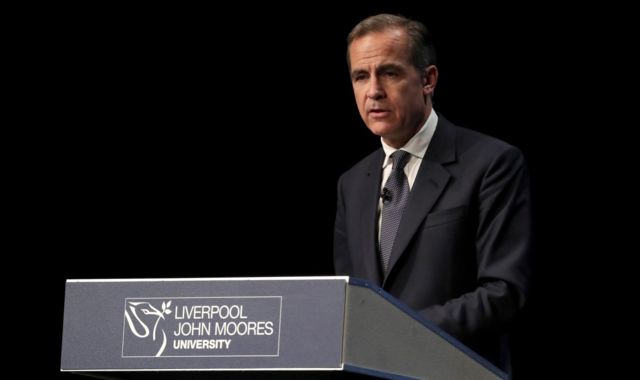
Photo: reuters.com
Thank you Governor Carney for your honesty and truthfulness: I am not surprised. Canadians are known to be polite and honest.
In your speech in Liverpool on Monday, you said: “We meet today during the first lost decade since the 1860s. Over the past decade real earnings have grown at the slowest rate since the mid-19th century.”
This lack of growth had caused inequalities, and has led people to question their futures and the benefits of globalisation.
Many people across the advanced world were “losing trust” in a system that did not “raise all boats”, you said.
Far from enjoying a “golden era”, globalisation for these people had become “associated with low wages, insecure employment, stateless corporations and striking inequalities”.
You warned: “Turning our backs on open markets would be a tragedy, but it is a possibility.”
The success of populist, anti-establishment movements, such as Brexit, the rise of the French Front National and the recent Italian referendum, has been linked to dissatisfaction with globalisation across Europe. Middle-class incomes in Western economies have suffered with the growth of Chinese and emerging-market manufacturing and widespread automation.
You also noted that putting “individuals back in control” by equipping workers with the skills needed to adapt to technological change were vital.
You also said “the tide must be turned back on stateless corporations” in order to maintain a sense of fairness. “Companies must be rooted and pay tax somewhere,” he said.
You then listed three priorities:
- “Economists must clearly acknowledge the challenges we face including the realities of uneven gains from trade and technology"
- "We must grow our economy by rebalancing the mix of monetary policy, fiscal policy and structural reforms"
- "We need to move towards more inclusive growth where everyone has a stake in globalisation."
Dear Governor Carney,
Thank you for what you said last night at Liverpool John Moores University: Very well said.
I do not wish to repeat myself again, but only to recall the words and sentiments of an Open Letter I had written to you on 12 June 2015, following on your fine speech at the Mansion House on 10th of June.
In that letter, and again now, I wish to share with you that, in order to achieve the goals you have set for us, then and now, we need to have:
3- A different educational values and models
4- We must ensure that there is, once again, a sense of trust and fairness in all we do.
5- And we must aim for an economy that is for the greater good, promoting social justice for all.
There in much more I can say and add to what I have noted above. But, I had said all these before in my Open Letter to you last year.
Therefore, I most humbly, offer the said Letter again for your kind attention and perusal:
Open Letter to Mark Carney, Governor of the Bank of England
I very much believe that if we take the above steps, and adhere to the points I have raised in my Letter, then, we have prepared the fertile soil to plant the seeds of what I believe is what people are asking for: Globalisation for the Common Good.
GCGI: Introduction and a bird’s eye view
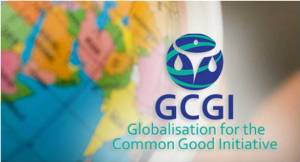
‘We recognise that our socio-economic problems are a reflection of our attitude to life and to one another. Justice, peace and harmony will come about only when the connection between the spiritual and practical in life is valued by each one of us and in society at large. This is beautifully expressed in a Chinese proverb:
“If there be righteousness in the heart, there will be beauty in the character.
If there be beauty in the character, there will be harmony in the home.
If there be harmony in the home, there will be order in the nation.
When there is order in each nation, there will be peace in the world.”
This brings the problems of life closer to home. It is not ‘they’ who have to change, but ’we’ who have to change our attitude. It is a journey from ‘what’s in it for me’ towards discovering, living and promoting the common good. The principle of the common good reminds us that we are all responsible for each other – we are our brothers' and sisters' keepers – and must work for social conditions which ensure that every person and every group in society is able to meet their needs and realise their potential. It follows that every group in society must take into account the rights and aspirations of other groups, and the well-being of the whole human family.
One of the greatest challenges of our time is to apply the ideas of the global common good to practical problems and forge common solutions. Translating the teachings of philosophers, spiritual leaders and religious scholars into practical policies that statesmen can apply across the world is a challenge which Globalisation for the Common Good Initiative (GCGI) has taken on. The purpose is not simply to talk about the common good, or simply to have a dialogue, but the purpose is to take action, to work for the common good, using dialogue to resolve differences.
What the GCGI seeks to offer - through its research and conferences, as well as its outreach and dialogue projects - is a vision that places the quest for economic and social justice, peace and ecological sustainability within a spiritual context and a practice of open-heartedness, generosity and caring for others. All are thus encouraged by this vision to serve the common good.
The GCGI has from the very beginning invited us to move beyond the struggle and confusion of a life preoccupied with materialism to a meaningful and purposeful life of hope and joy, gratitude, compassion, and service for the good of all.
Perhaps our greatest accomplishment has been our ability to bring Globalisation for the Common Good into the common vocabulary and awareness of a greater population along with initiating the necessary discussion as to its meaning and potential in our personal and collective lives.
In short, at Globalisation for the Common Good Initiative we are grateful to be contributing to that vision of a better world, given the goals and objectives that we have been championing since 2002.’
Thank you.
- Details
- Written by: Kamran Mofid
- Hits: 5386
This is the crisis of our times, and how we respond to it is a test of our values, our spirit, our humanity, our ingenuity, our generosity, and our sincerity
The Gift of Refugees and Migrants
A Heartwarming Project and Story from Germany
Syrian refugee Ghuzoun and German teacher and artist Brigitte
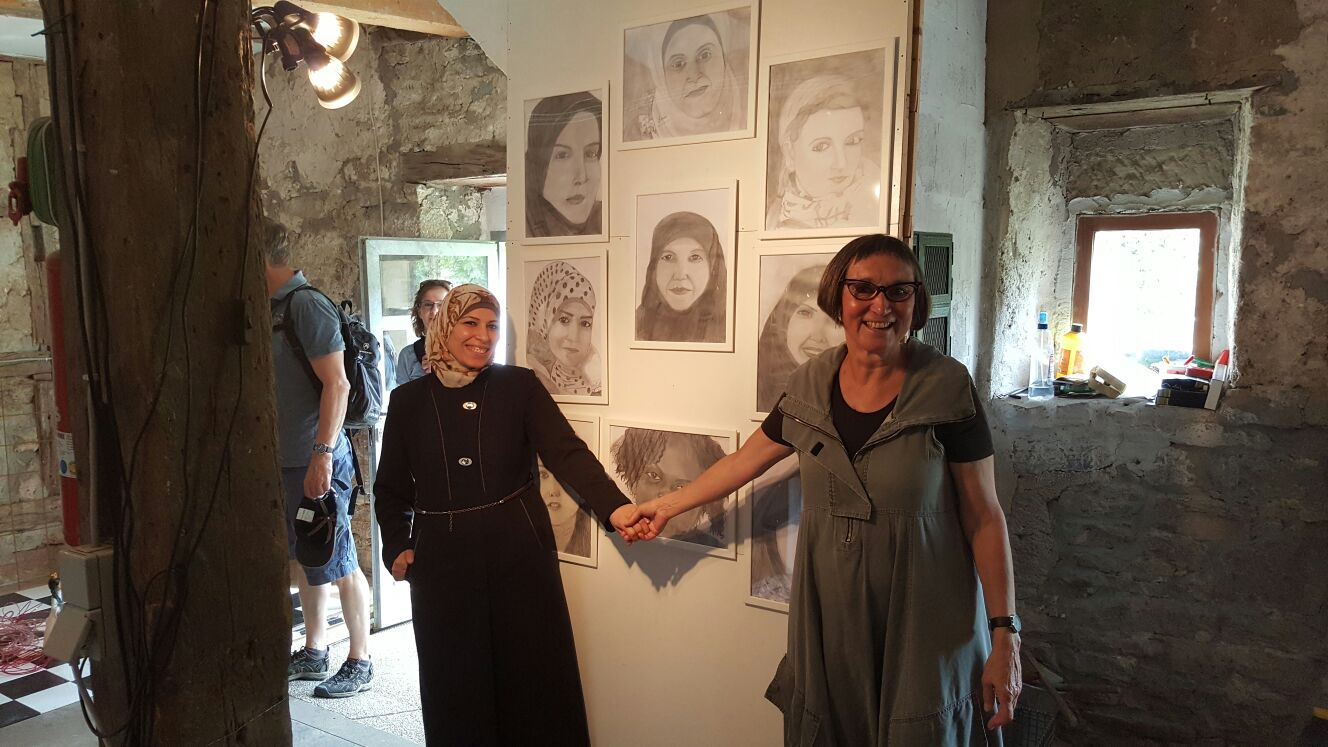
Brigitte and Ghuzoun, May 2016, Germany
Nota bene
"Injustice flourishes in soil where empathy has been uprooted.”
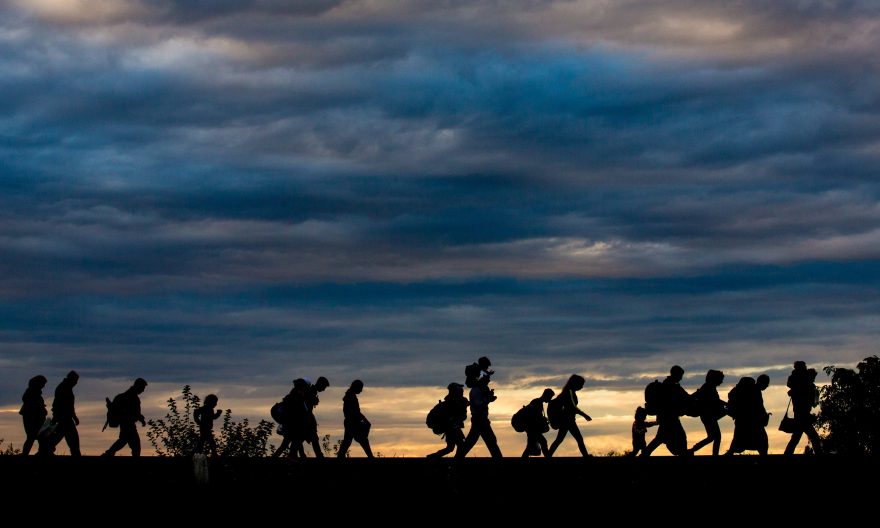
Photo: stepsofjustice.org
We Refugees
…I am told I have no country now
I am told I am a lie
I am told that modern history books
May forget my name.
We can all be refugees
Sometimes it only takes a day,
Sometimes it only takes a handshake
Or a paper that is signed.
We all came from refugees
Nobody simply just appeared,
Nobody's here without a struggle,
And why should we live in fear
Of the weather or the troubles?
We all came here from somewhere.-Benjamin Zephaniah
This is the crisis of our times, and how we respond to it is a test of our values, our spirit, our humanity, our ingenuity, our generosity, and our sincerity
The Gift of Refugees and Migrants
'The Refugee's Gift:Here are people who have escaped from persecution and who have benefited from our long tradition of offering asylum. They may have arrived recently from conflicts in Syria, Eritrea, or Somalia, or sought safety decades ago from Hitler’s Germany. Men and women, young and old, rich and poor, most arrived with few material possessions – but they all came with an unstoppable determination to make a new life.’-Refugee Council, UK
‘It is a compelling theory, especially when you reflect upon the fact that Albert Einstein, Sigmund Freud, Mikhail Baryshnikov, Rudolf Nuryev, Marlene Dietrich, Alexandre Solzhenitsyn and Vladimir Nabokov were among but a few celebrity refugees and migrants. Imagine what the world would have missed had they not managed to forge a better life outside their country of origin.’-RadioFreeEurope
For our first ever GCGI Christmas appeal, I have chosen refugees as our theme, not just to raise money for a refugee in Germany, but as an act of solidarity. Our appeal slogan is We Stand Together: a stand against intolerance, xenophobia, racism and fear; a stand against building walls between nations and peoples, a stand for empathy, sympathy and generosity. And a stand for clarity and perspective: Brexit and Donald Trump have shown us that our cause is noble, timely and greatly needed: As informed individuals, we know that one must not start to equate the issue of refugees with terrorism.
Our appeal is very modest: to raise a small sum of money for a refugee in Germany, so that we can say it, loud and clear: We stand against inhumanity and we are all for social justice, peace and harmony on this planet earth, we call our home.
Syrian refugee Ghuzoun meets German teacher and artist Brigitte
Introduction by Kamran Mofid
Brigitte, a dear friend of the GCGI, is a German teacher, artist, activist and volunteer, working directly with refugees and asylum seekers in Germany, supporting them to rebuild their lives, helping them to settle down, finding their path and calling to a better life.
One of those refugees that Brigitte has worked with is Ghuzoun Hazwani, a refugee from Syria. With the help and encouragement from Brigitte, Ghuzoun started to do portraits of her loved ones as a path to healing, inner-peace and contentment. Below, in her own words and sentiments, Brigitte has explained a bit more for your reflection.
In September 2016, Brigitte joined us at our 3rd Joint GCGI-SES Conference at Waterperry House, she told us a beautiful story of when she met Ghuzoun; and then exhibited a sample of Ghuzoun’s drawings at the beautiful courtyard of the House. A very memorable moment for all of us present, I am sure.
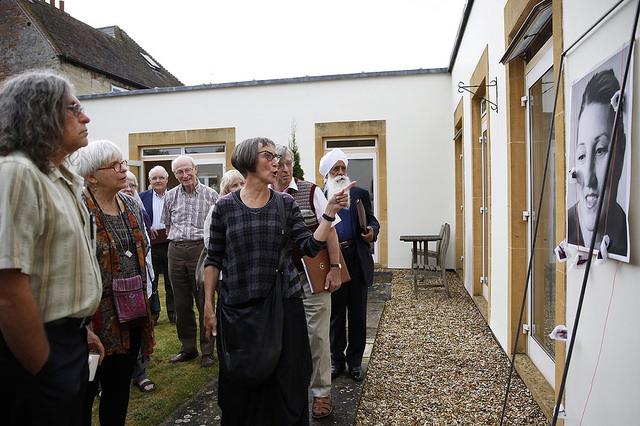
Brigitte (front-centre) at Waterperry House. Photo: av.gnnsj
After the Conference, I encouraged Brigitte to make these portraits and more, available to the public to purchase, so that we can create a small amount of income for Ghuzoun, to enable and empower her to continue her artistic work more effectively.
So, I am now pleading with you to purchase one, two, or more of her drawings for yourself, or give away as a gift of love to others. Please also note that, Ghuzoun is willing to do portraits from your personal photos, should you wish to send them to her.
The portraits are priced the modest sum of 25 Euros each (inclusive of frame and shipping costs). Brigitte has set up a PayPal account for her, to which you can pay into (see all the details below).
Now please read the story in Brigitte’s own words and view some of Ghuzon’s portraits.
I very much thank you in advance for your kind support for this project.
Kamran Mofid.
Syrian refugee Ghuzoun meets German artist Brigitte
By Brigitte Volz
The title of an artistic work I have done during the last two years is: “German Women’s Thread of Life.”
It was mainly a photographic work – presented in an installation.
The goal was to find out what defines a woman as a German woman.
Her German passport which grants her the right to live in Germany for a temporary or unlimited period – in particular if she is not born in Germany?
All women featured in my photo essay live in Germany. Some hail from families living in this country for generations. Some live here as first and second generation migrants or just arrived as refugees from Iraq, Palestine, Ethiopia, Macedonia, Syria, Chechnya or from the Sudan.
Knowing these women from my private or professional life, I intended to learn more about their life and to keep hold of this experience: Using photos, which I had shot listening to their tales. The telling of their experience is mirrored, notably in the expression of the mouth.
The aim of the work was not to shoot professional photos – but to get in contact with the women and focus on the emotions behind their stories through a third eye.
A Syrian woman who entered my atelier brought a new aspect into my work. Her name is Ghuzoun Hazwani. She had recently come to Germany as refugee from Syria.
She started drawing portraits after my photos. Then she used the photos of her beloved ones on her mobile phone: Still alive or killed in the war.
The fact that Ghuzoun had an exhibition together with me in May 2016 was very encouraging for her and all the other refugees in our community.In August 2016 I had the chance to present the exhibition again at Oxford, Waterperry House during the GCGI conference. The presentation was highly appreciated by the participants of the conference and some spontaneously bought drawings of Ghuzoun.
This inspired Kamran Mofid to try and create an income for her by offering her drawings on this website.
Below you can see a sample of Ghuzoun drawings and should you wish to buy them or commission her to do drawings from your own photos, I have set up a PayPal account to which you can submit your payments: paypal.me/BrigitteVolz.
You may also send me an email to b1@brigittevolz.de to confirm your order, send a message to Ghuzoun, or any questions you may have.
- Details
- Written by: Kamran Mofid
- Hits: 12483
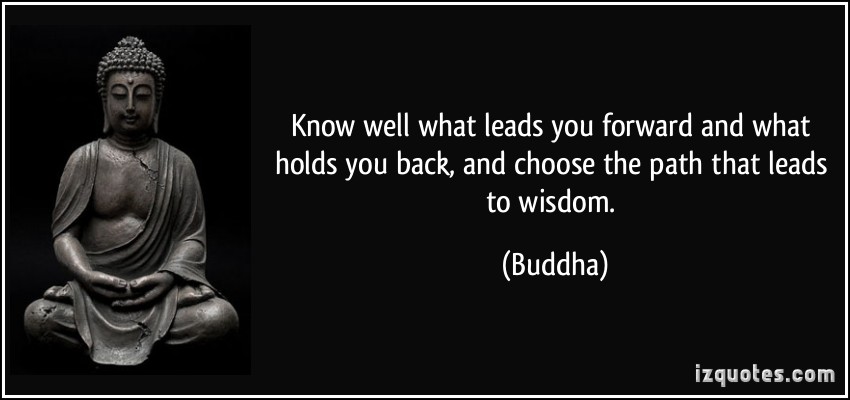
In a recent excellent article, George Monbiot , in response to the crisis that lies behind Brexit and Trump, concludes that, what we need is “a new story of what it is to be a human in the 21st century and to reclaim our humanity” (Our first step is to reclaim our humanity, The Guardian, 14 November 2016).
Whilst I agree fully with this most eloquent analysis on the destructive consequences of neoliberalism in general, I wish also to mention that, in order “to reclaim our humanity”, what we actually need is a revolution in our institutions of learning.
We must rise and truly reflect on these three pertinent questions that T. S. Eliot has asked us:
"Where is the Life we have lost in living? Where is the wisdom we have lost in knowledge? Where is the knowledge we have lost in information?"
In order to solve the grave global problems we face – climate change, population growth, environmental degradation, extinction of species, war, acts of terrorism, inequality, intolerance, racism, refugees, xenophobia, building walls between nations and peoples, and the rest – we need governments to act appropriately.
But, given what’s on offer, governments are unlikely to be much more enlightened, or indeed, informed, than electorates. Hence we require the public to have a good understanding of what the problems are, and what the solutions may look like.
- Black Friday, Brexit and Trumpian Values: Deadly forces taking over our world, controlling our minds
- The new Brexit and Trumpian World Order: Will they engulf Europe and the rest of the world?
- Beyond the Agony and Hatred
- THE BATTLE OF THE SOMME, A HUNDRED YEARS ON
- Fat Cats: An invitation to dialogue
